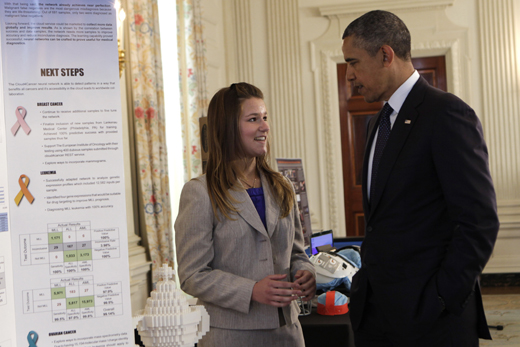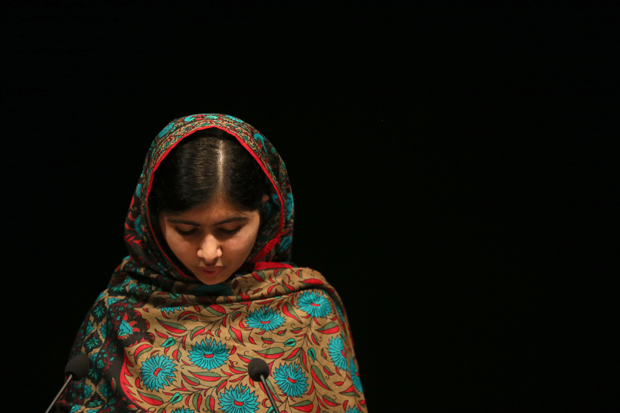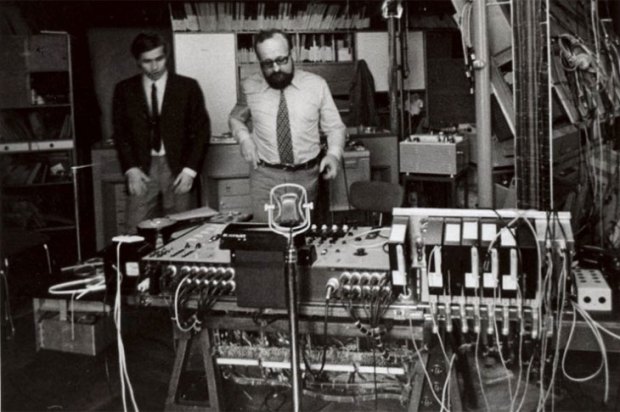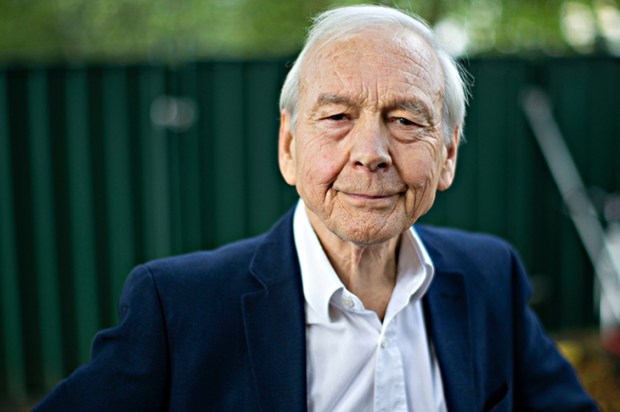It was when she said how she loved ‘watching the computer do exactly what you wanted it to do’ that I realised how exceptional she must be. To be so young, just 19, and so at home with technology that you can control it rather than be in awe of its complexity. By the age of 11 Brittany Wenger was teaching herself computer coding, after being inspired by a course at primary school in ‘Futuristic Thinking’. She didn’t find it easy, but she found it ‘a lot of fun’, which says a lot about her. First she persisted in spite of the difficulty, and second she found amusement in that toil and tedious repetition.
Brittany is one of ten teenagers featured on this week’s Radio 1 Stories for having done something that has the potential to change the world. In Brittany’s case she devised a software program that is 99 per cent effective in diagnosing breast cancer. Twice her experiments failed completely but she persevered (driven on by the fact that at the time her cousin was being treated for the disease) and now she says she learned a lot from those earlier mistakes.
Brittany was in elite company on Tuesday night. Gemma Cairney (too old at 29 to be included but a game-changer herself because of the way she’s able to make Radio 1 sound serious) also talked to Malala Yousafzai, who at 15 was shot and almost killed by the Taleban because of her outspoken demands that girls should have freedom of access to education, and who has now been awarded the Nobel Peace Prize for continuing her campaign in spite of her injuries. What has her experience taught her? ‘That I should not be afraid of anything.’

Malala spoke with such poise and clarity of purpose it was quite humbling. In fact what these ten teenagers shared was an eerie maturity, a certainty and awareness of their essential gift, whether it be for computer technology, house music, hip hop, or gutsy speaking out about issues such as knife crime (Eliza Ribeiro of the Lives not Knives campaign) or female genital mutilation (Muna Hassan). When Brittany set out on her mission to establish a coding system that could help with cancer diagnosis she had no idea she would be able to do it. It’s that combination of a willingness to experiment, to try and fail, and then to try again that characterised all these young people. Not to be deterred, put off, diverted from their instinctive drive to fulfil themselves.
These interviews (produced by Milly Chowles) were packaged Radio 1-style with snippets of Sam Smith, Clean Bandit, Kool Herc, Beyoncé, but the programme was so upbeat and the youngsters so full of hope and enthusiasm that even the music sounded great.
Back in the 1930s, when Ivy Benson wanted to play the saxophone, she was told it was not the right instrument for her, ‘it would not be ladylike’. But she, too, was gifted and determined and within a few years she could not only play sax and clarinet but had also set up her own all-girl band that was soon outclassing the men. We owe a lot to her, says Melanie Chisholm, the former Spice Girl, because of what Benson did, touring the country with her All Girl Band, and pushing on in spite of all the criticism she aroused simply for being a woman and daring to do what she did.
In Radio 4’s Ivy Benson: Original Girl Power (produced by Clair Wordsworth), Chisholm talked to some of the players who had been taught by Benson how to play trombone, trumpet, sax. Many of them were doing humdrum jobs in the mills or munitions factories and playing music just for fun. Once picked by Benson they found themselves in Egypt, Tripoli, France, Germany, Cyprus, Malta, entertaining the troops during the war. ‘There was nothing we couldn’t do,’ they told Chisholm. ‘We were earning our own living. Not dependent on men.’
This did not make them popular with everyone. Benson was asked as late as 1984, ‘Was it rather quaint for a girl to take up the saxophone?’ People came to see the band out of curiosity, only to be surprised at how good they were. The critics, though, couldn’t help adding ‘for women’. Some of the male musicians commissioned to write arrangements for the band deliberately wrote in wrong notes on their scores so that the band would sound off-key. This didn’t work because Benson was too sharp, too thorough, too good a musician to be outwitted. Of course, she didn’t brag about her success, saying on a Woman’s Hour interview before she died (in 1993), ‘I’m just doing a job.’
But hats off to Chisholm (no relation) for bothering to find out about Benson who at the time was as big as Glenn Miller or Vera Lynn, and to acknowledge that she paved the way for her own rather different brand of girl power.
Got something to add? Join the discussion and comment below.
Get 10 issues for just $10
Subscribe to The Spectator Australia today for the next 10 magazine issues, plus full online access, for just $10.
You might disagree with half of it, but you’ll enjoy reading all of it. Try your first month for free, then just $2 a week for the remainder of your first year.














Comments
Don't miss out
Join the conversation with other Spectator Australia readers. Subscribe to leave a comment.
SUBSCRIBEAlready a subscriber? Log in